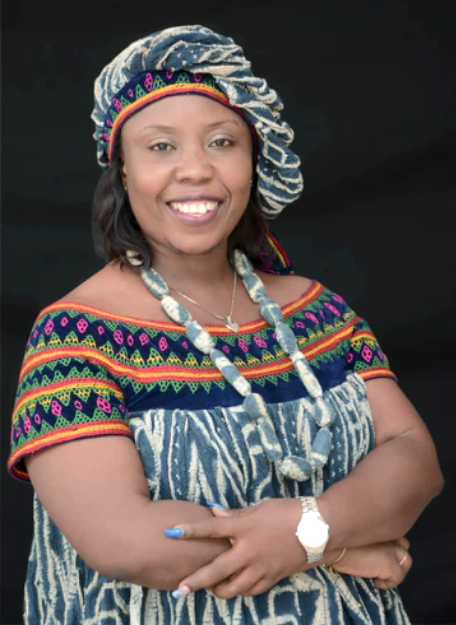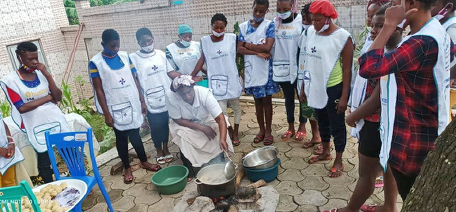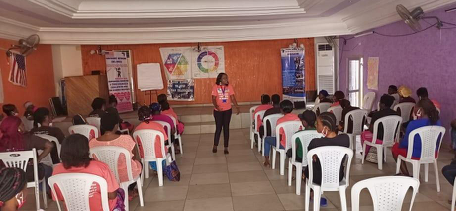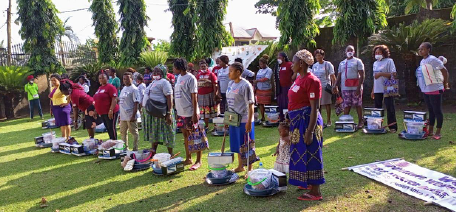Real Life Stories: People Trafficking in Cameroon (Survivors' Network)
The latest in our series of partner interviews is with Awah Francisca Mbuli. Liluye’s staff writer, Sylvia Nalubega, interviewed Awah to find out more about her and her organization’s work. Awah is an activist and founder of Survivors’ Network (SN), Cameroon/Africa, a female, survivor-led organization that seeks to combat human trafficking and its effects.
How did you first get involved in being part of this work? In other words, what motivated you, or still drives you, to work on the issue of trafficking? Can you share a personal story?
I am a survivor of labor and sex trafficking, and almost a victim of organ trafficking. Thankfully, I managed to come back home to Cameroon. My ordeal inspired me to start the Survivors’ Network because I feel passionate that every survivor has a powerful voice in helping to eliminate trafficking and all associated abuses. For this reason, we are very survivor inclusive in the operations of our organization.
What are the specific mission and goals of your organization?
At Survivors’ Network, our mission is to combat human trafficking and its effects. We have worked in nine regions in Cameroon and the sub-Saharan African countries of Ghana, Nigeria, and Senegal.
“Since 2015 when we started, we have reached over 5,000 women and girls.”
Since 2015 when we started, we have reached over 5,000 women and girls. Due to the current Anglophone political crisis in Cameroon, however, we are getting even more women and girls that have been identified through church leader and organization referrals, as well as by word of mouth from community members. The crisis, which has been going on since 2016, has led to untold suffering, loss of properties, persons internally displaced, and death. We rescue and reintegrate these women and girls back into the community.
We run a shelter/safe home where vocational training and much of our work is done. We are very survivor inclusive, and disability inclusive, too. Over 900 women, girls, and children have passed through our facility during its one year existence. We do a lot of economic empowerment because poverty is the root cause of human trafficking here. Our economic empowerment activities include training in entrepreneurship, business, finance management, writing business proposals, vocational skills, and providing startup capital. We enable the beneficiaries to identify local resources within their reach to make products, such as local snacks, that they sell on roadsides. That way they can earn a daily income.
We train women in dressmaking, hairdressing, knitting, and other vocational arts that they can use to help them gain employment and set up small businesses. Currently, we are working with 120 women and girls. In our safe home, we provide meals, clothes, and accommodation for women, girls, and their children who have been internally displaced due to the political crisis. We also do sensitization campaigns among women, girls, children, and men on identifying potential traffickers and how to avoid being trafficked.
What is the severity of human and sex trafficking in your area?
The rate of human trafficking is higher than before due to the political crisis in Cameroon. Now, children are being trafficked by their relatives and are taken to the cities to do child labor. There is also a lot of sex trafficking in the cities where girls are unknowingly influenced by their peers into it.
What are the long-term implications of human trafficking, especially on women and girls?
In our region, there is a growing number of teenage pregnancies. We have had about 30-40 girls that are between 14-18 years old who have had a child recently. This not only affects them physically and emotionally but predisposes them to be more vulnerable to human trafficking as a means of survival and income generation.
Is there anything else you would like to add?
We cannot do this alone. We need to have a global movement that addresses human trafficking. Together we can do more and make more impact to end it!
What kind of support do you need for your work and where are you located?
Survivors’ Network needs more funding (to reach more women and girls); technical support in organizational strengthening and entrepreneurship development; and psychosocial support training and sessions for our staff and counselors. We also need more sewing machines, hairdressing equipment, other donated materials, and sponsors to provide startup kits to provide essential resources after vocational training. For example, those who have learned hairdressing will need a hair dryer, hair products, a sink, and braided hair extensions, and for those who learned dressmaking will need a sewing machine, needles, thread, and fabric. Until now, we haven’t been able to offer any trainee a startup kit due to a lack of funding.
Where to send funding for your work?
To fund the work of Survivors’ Network, please email: info@survivorsnetwork.co or awahfrank@gmail.com; or phone: +237 673523380.
To find out more about Survivors’ Network:
Visit Survivors’ Network on the web: Survivors’ Network
Visit Survivors’ Network on Facebook: Survivors’ Network
Visit Survivors’ Network on Instagram: Survivors’ Network
Visit Survivors’ Network on Twitter: Survivors’ Network
For more information about Liluye or to inquire about becoming a partner, please visit: www.liluye.org/contact. Or, if you are interested in donating to Liluye, please visit: www.liluye.org/donate.
Awah was interviewed by Liluye Staff Writer, Sylvia Nalubega, who also writes on her blog, Sanyu Centre for Arts and Rights. Sylvia’s personal message to everyone is, “We live beyond ourselves by sharing our story to hopefully impact a person.”




